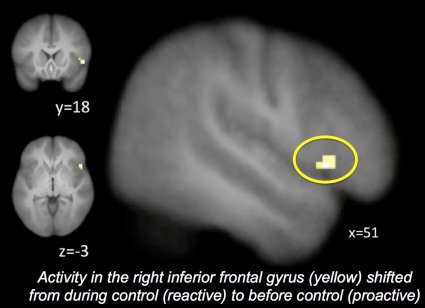EUGENE, Ore. — (Jan. 2, 2014) — Search for "brain training" on the Web. You'll find online exercises, games, software, even apps, all designed to prepare your brain to do better on any number of tasks. Do they work? University of Oregon psychologists say, yes, but "there's a catch."
 The catch, according to Elliot T. Berkman, a professor in the Department of Psychology and lead author on a study published in the Jan. 1 issue of the Journal of Neuroscience, is that training for a particular task does heighten performance, but that advantage doesn't necessarily carry over to a new challenge.
The catch, according to Elliot T. Berkman, a professor in the Department of Psychology and lead author on a study published in the Jan. 1 issue of the Journal of Neuroscience, is that training for a particular task does heighten performance, but that advantage doesn't necessarily carry over to a new challenge.
The training provided in the study caused a proactive shift in inhibitory control. However, it is not clear if the improvement attained extends to other kinds of executive function such as working memory, because the team's sole focus was on inhibitory control, said Berkman, who directs the psychology department's Social and Affective Neuroscience Lab.
"With training, the brain activity became linked to specific cues that predicted when inhibitory control might be needed," he said. "This result is important because it explains how brain training improves performance on a given task — and also why the performance boost doesn't generalize beyond that task."
 Sixty participants (27 male, 33 females and ranging from 18 to 30 years old) took part in a three-phase study. Change in their brain activity was monitored with functional magnetic resonance imaging (fMRI).
Sixty participants (27 male, 33 females and ranging from 18 to 30 years old) took part in a three-phase study. Change in their brain activity was monitored with functional magnetic resonance imaging (fMRI).
Half of the subjects were in the experimental group that was trained with a task that models inhibitory control — one kind of self-control — as a race between a "go" process and a "stop" process. A faster stop process indicates more efficient inhibitory control.
In each of a series of trials, participants were given a "go" signal — an arrow pointing left or right. Subjects pressed a key corresponding to the direction of the arrow as quickly as possible, launching the go process. However, on 25 percent of the trials, a beep sounded after the arrow appeared, signaling participants to withhold their button press, launching the stop process.
Participants practiced either the stop-signal task or a control task that didn't affect inhibitory control every other day for three weeks. Performance improved more in the training group than in the control group.
Neural activity was monitored using functional magnetic resonance imaging (fMRI), which captures changes in blood oxygen levels, during a stop-signal task. MRI work was done in the UO's Robert and Beverly Lewis Center for Neuroimaging. Activity in the inferior frontal gyrus and anterior cingulate cortex -- brain regions that regulate inhibitory control -- decreased during inhibitory control but increased immediately before it in the training group more than in the control group.
The fMRI results identified three regions of the brain of the trained subjects that showed changes during the task, prompting the researchers to theorize that emotional regulation may have been improved by reducing distress and frustration during the trials. Overall, the size of the training effect is small. A challenge for future research, they concluded, will be to identify protocols that might generate greater positive and lasting effects.
Co-authors of the study with Berkman were Lauren E. Kahn and Junaid S. Merchant, doctoral students in psychology. Internal UO faculty research awards supported the project.
The findings are in line with a growing body of studies that are exploring the impact of brain-training programs. Recent research has been covered by various media outlets, including The Observer (UK), the Motley Fool and ABC News.
About the University of Oregon
The University of Oregon is among the 108 institutions chosen from 4,633 U.S. universities for top-tier designation of "Very High Research Activity" in the 2010 Carnegie Classification of Institutions of Higher Education. The UO also is one of two Pacific Northwest members of the Association of American Universities.
Media Contact: Jim Barlow, director of science and research communications, 541-346-3481, jebarlow@uoregon.edu
Source: Elliot Berkman, assistant professor of psychology, 541-346-4909, berkman@uoregon.edu
Additional Links:
Follow UO Science on Facebook: http://www.facebook.com/UniversityOfOregonScience
UO Science on Twitter: http://twitter.com/UO_Research
More UO Science/Research News: http://uoresearch.uoregon.edu
Note: The University of Oregon is equipped with an on-campus television studio with a point-of-origin Vyvx connection, which provides broadcast-quality video to networks worldwide via fiber optic network. In addition, there is video access to satellite uplink, and audio access to an ISDN codec for broadcast-quality radio interviews.